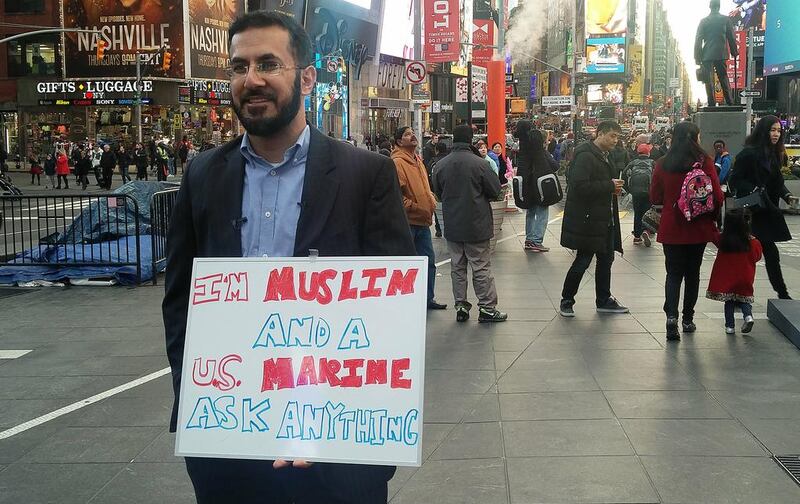NEW YORK // Mansoor Shams finds a quiet spot in the middle of Times Square, sets down his whiteboard and writes a simple message in marker pen: “I’m Muslim and a US Marine: Ask anything”.
For the next three hours he fields questions from passers-by keen to know how he reconciles his military life with his faith, his views on Donald Trump and Islam’s attitude to women.
“I’m just trying to start a conversation,” is how Mr Shams, who was born in Pakistan and raised in the US, modestly describes his mission.
New York is the latest stop on his one-man quest to help Americans better understand Islam. During the past month he has taken his sign to the west coast cities of Seattle and Portland, answered questions in Texas and Colorado, as well as on the streets of his home town of Baltimore.
He said he was motivated by a 2010 survey in which 62 per cent of Americans said they had never met a Muslim.
Although the figure has dropped to a little less than half in recent years, Mr Shams said the rise of Mr Trump and post-fact politics made it even more important to dispel negative stereotypes.
“I think there’s a big knowledge gap,” he said. “You can get on TV and say anything, and scare the heck out of people.
“That’s why I feel I have to get out and counter that.”
During his presidential election campaign, Mr Trump explicitly called for a ban on foreign Muslims entering the US. Although he has since dropped the proposal, his executive order suspending the entry of travellers from seven mainly Muslim nations is viewed by many as a form of religious discrimination.
His administration has also overturned Barack Obama’s policy of referring to “violent extremism” in favour of an explicit link with religion in the form of the phrase “radical Islamic extremism”.
During the campaign, Mr Trump said he believed “Islam hates us”.
And Gen Michael Flynn, his national security adviser until Monday when he resigned over his contacts with Moscow, claimed Islam was not a religion but a “political ideology” hiding behind the “notion of it being a religion”.
Mr Shams has written to the new president offering to help him better understand Islam.
“So far no response, but I think it would be to his benefit to know that there are people who are Muslims who are also US marines,” he said. “If I could be of any help to remove some of the misconceptions or understanding, I would love to do that.”
The Shams family arrived in the American state of Maryland 28 years ago. As members of the Ahmadiyya community they suffered persecution in Pakistan, and left for the freedom offered by the US.
Mr Shams joined the Marines at the age of 18, straight out of school. He served for four years in a unit stationed in North Carolina.
It coincided with the 9/11 terrorist attacks, which brought episodes of namecalling – “Taliban” and “bin Laden” – but also an opportunity to educate his fellow marines.
“A few people don’t get to define who the Marine Corps represents, like someone who blows themselves up doesn’t get to define the 1.6 billion Muslims,” he said.
His conversation is interrupted frequently by the curious.
One man questions him on the Palestinian cause before explaining why he believes the 9/11 attacks were a false flag operation carried out by the CIA.
Elladee Windsor, a student visiting from Canada, asks whether he sees himself first as a marine or as a Muslim.
His speaks slowly as he answers, choosing his words carefully to describe his relationship with America, his faith and the duties it brings.
“I’m a marine because I’m a Muslim,” he concludes neatly, knitting the threads of his life together and his need to serve his country.
They exchange high fives before she heads on her way through the Times Square throng.
Others thank him for his service. Some just stare for a few seconds, reading his sign, before moving on.
“Some will come and ask questions, some won’t but they read it and they get a message – that people who look like me can be marines,” he said.
His outreach work began two years ago when a friend and mentor suggested his former life as a marine offered a perfect platform to build bridges in America. A website and visits to faith groups followed. But his work really took off in the past month with his roadshow.
Mr Shams’ mission piggybacks on his day job, running an electronics export business and a couple of mobile phone franchises. His pinstriped suit gives away the fact he was in town for a business meeting.
So far, his expeditions have generated mostly warm experiences. Only one prickly encounter, in Houston, Texas, stands out.
A man walked past his sign and gave Mr Shams a filthy look. It turned out he had only seen the word “Muslim” but was willing to listen to a former marine talk about life serving in the US military.
“By the time we finished, he admitted he had been ignorant. This was a guy who said he hated minorities before.”
foreign.desk@thenational





